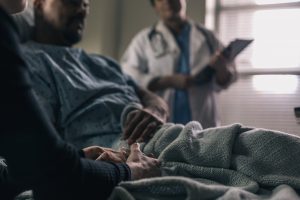HIV and African Americans
Recent statistics from the CDC on HIV prevention show that African Americans have a greater proportion of new HIV/AIDS diagnoses than other racial/ethnic groups. In 2015, African Americans had 45 percent of HIV diagnoses.
The report further revealed that:
- In the U.S., 17,670 of those diagnosed with HIV were African Americans.

- Over half (58 percent) of new African American HIV cases were bisexual or gay men.
- 38 percent of African American men who had sex with men (MSM) were between the ages of 13 and 24 years.
- 8,702 (48 percent) of people diagnosed with AIDS were African Americans.
- The total number of African American women diagnosed with HIV in 2015 fell by 42 percent.
- In 2015, the HIV diagnoses among African American women was over 4,500.
- The number of HIV cases among African American MSM increased by 22 percent.
In different ways, the African American population has had a greater increase in HIV cases than all other major ethnic groups in the U.S. This means there are more deaths caused by HIV/AIDS among this group. Unfortunately, many black children are becoming fatherless and many women are becoming widows. The future of the children of such men will be adversely affected by the rise in HIV cases because their fathers and mothers will not be able to provide adequately for their needs due to sickness or untimely death. As we observe National Black HIV/AIDS Awareness Day, we’d like to share some suggestions for a healthy and safe sex life.
Ways to Prevent HIV/AIDS
There’s an urgent need to focus on how to prevent HIV/AIDS among the African American community. As an African American, here are two things you can do to ensure you don’t get infected or spread the virus.
Get Tested
Make it a point of duty to go for an HIV test at least twice a year. You don’t need to be afraid of asking your doctor, “Do I have AIDS?” There are no stigmas attached to this and early detection can help you begin taking appropriate medication to prevent untimely death.
Use Condoms
To prevent HIV infection, you need to practice safe sex. Discuss with your partner and assess their awareness. Ask questions like:
- “What is HIV?”
- “Do you know your status?”
- “Do you mind using a condom?”
Use a condom each time you have sex. Using condoms correctly can help you prevent the transmission of HIV and STDs through blood, seminal, vaginal or rectal fluids.
Sterilize Injection Equipment and Don’t Share With Others
Never share injection instruments such as needles or syringes with anyone and make sure you only receive sterilized injections. After sexual relations, sharing drug syringes and needles with another person who has HIV is the most common way African Americans contract HIV. Sharing needles allows HIV to spread through blood contact.
Ways to Treat HIV/AIDS
- Take Medicine: HIV medication may be used to diminish the risk of HIV infection shortly after exposure to the virus. This type of medication is known as post-exposure prophylaxis (PEP). PEP works after a person has had sex without using a condom with an infected partner. To be effective, it must be taken within 72 hours after exposure. This medication needs to be taken for about four weeks to be fully effective.
Similarly, women infected with HIV can take medicine to prevent transmitting the disease to their unborn child. The newborn child will also receive HIV medication for about four to six weeks after birth. This medicine will reduce the chances of infecting the baby with the virus in utero. - Use Condoms: To prevent your partner from getting infected with HIV, you must use a condom correctly each time you have sex. Using condoms the prescribed way will prevent the transfer of HIV infection and other sexually transmitted diseases each time you have vaginal, anal or oral sex. It will prevent the mixing of vaginal fluids, rectal fluids, pre-seminal fluids, semen or blood, which allow the spread of HIV.
Ask Us for Help!
At Hamilton Healthcare, we offer HIV testing and counseling. We’re a Federal Qualified Health Center and we don’t discriminate against anyone based on sexual orientation. So, we encourage you to be open about your needs and ask all the questions you wish. To get more information about HIV/AIDS prevention and treatment, give us a call at (717) 232-9971 today.


